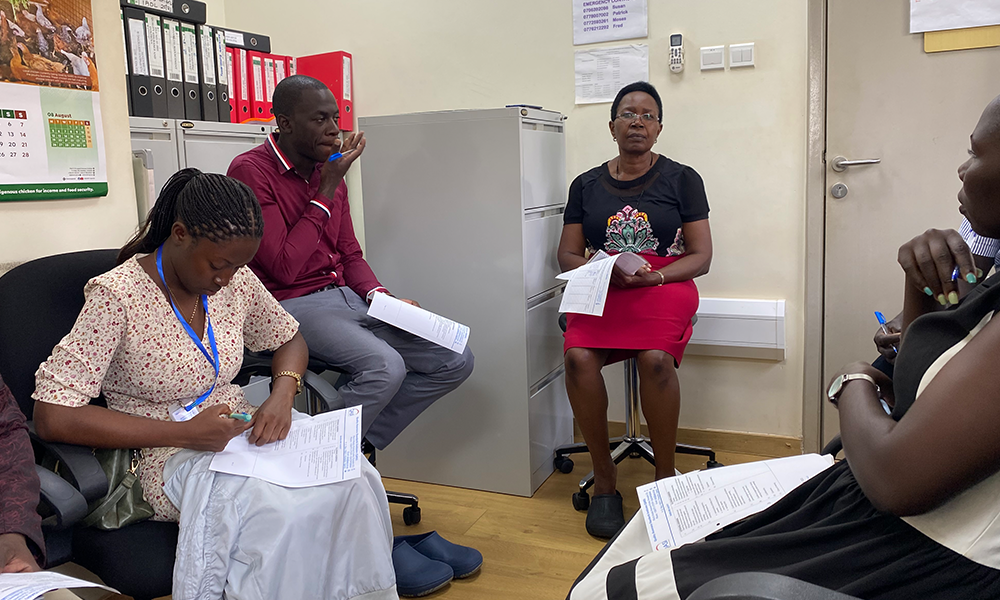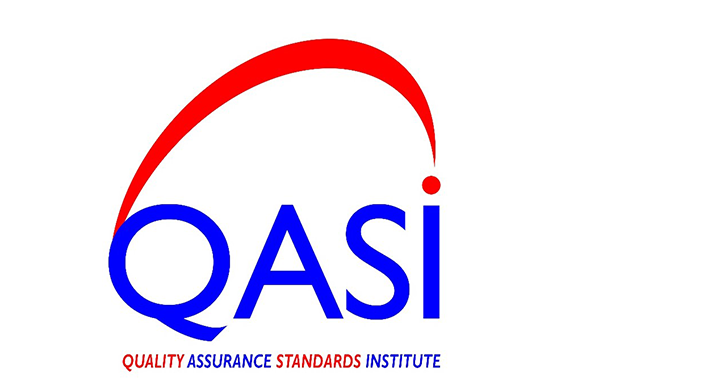Biosafety and Biosecurity (ISO 35001& ISO 15190)

Food and Agricultural Organization (FAO) of the United Nations (UN) warns that growth in animal and human populations in Africa, as well as frequent interaction with wildlife and livestock, will increase the risks of zoonotic disease outbreaks, including emerging and re-emerging infectious diseases (EIDs) and antimicrobial resistance (FAO, 2019). These can have devastating societal consequences, such as the loss of animals and human lives, restrictions on people’s movements, the closure of businesses and public offices, trade bans, a decrease in tourism, food insecurity, social unrest, and political instability.
With the increased risk of zoonotic disease outbreaks, diagnostic services are an essential component of effective service delivery; clients must be provided with accurate, dependable, and timely results while maintaining a safe working environment. These necessitate ongoing quality improvement initiatives aimed at bolstering, updating, and sustaining diagnostics, which are critical in epidemiological disease surveillance, control, and research. This can only be accomplished by accrediting veterinary laboratories.
Biosafety and Biosecurity
Biosafety and biosecurity are critical concepts in the management of biological materials, particularly in laboratories and other research facilities. They focus on preventing the unintentional release of biological agents and protecting against their intentional misuse, respectively.
ISO 35001: Biorisk Management for Laboratories and Other Related Organizations.
Provides a framework for establishing, implementing, maintaining, and continually improving a biorisk management system (BRMS) to prevent the unintentional release of biological agents.
Key elements: Risk assessment, hazard identification, containment measures, emergency preparedness, and personnel training.
ISO 15190: Medical Laboratories—Requirements for Safety
Focuses specifically on the safety aspects of medical laboratories, complementing ISO 15189 (which addresses quality and competence).
Key elements: Laboratory design, safety equipment, procedures for handling biohazardous materials, and emergency response plans.
Together, ISO 35001 and ISO 15190 provide a comprehensive approach to managing the risks associated with working with biological materials. By implementing these standards, organizations can create safer working environments, protect public health, and comply with international regulations.
Through strengthening Biosafety and Biosecurity coordination at National level countries can ensure safety of all its nationals by ensuring capacity building efforts of locals through training on key requirements including ISO 35001 and ISO 15190, through development of relevant Biosafety and Biosecurity Polices and frameworks and enforcing them; setting up National pathogen inventory as well as regulation and establishment of biobanks. Several policies, and guidelines (BRM manual, national checklist, infrastructure, waste management) should be developed under the one health program and formation and functionalization of regulatory structure to oversee the implementation of laboratory Infrastructure guidelines.
- Reduced risk of accidents and incidents
- Improved safety culture and employee morale
- Enhanced public trust and confidence
- Compliance with regulatory requirements
- Increased international recognition and credibility
QASI is excited to support you, contact us to begin with the first step!
Explore our courses and find the perfect fit for your needs.
- Biosafety and Biosecurity Implementers’ course based on ISO 35001 and ISO 15190 -Management Track.
- Biosafety and Biosecurity Implementers’ course based on ISO 35001 and ISO 15190-Technical Track.
- Biorisk Auditor’s course based on ISO 35001,ISO 15190 and ISO 19011.
- Biosafety and Biosecurity Mentors’ course based on ISO 35001 and ISO 15190.
- Biosafety and Biosecurity Trainers’ course based on ISO 35001 and ISO 15190.
By understanding and adopting these standards, organizations can effectively manage biosafety and biosecurity risks and contribute to a safer and healthier world.
- Laboratory management: Laboratory directors, managers, and supervisors
- Biosafety officers: Individuals responsible for implementing and managing biosafety programs
- Scientists and researchers: Researchers working with biological materials, including pathogens and genetically modified organisms
- Risk managers: Individuals responsible for identifying, assessing, and mitigating risks associated with biological agents
- Regulatory affairs professionals: Individuals involved in ensuring compliance with biosafety and biosecurity regulations
- Quality assurance professionals: Individuals responsible for ensuring the quality of laboratory operations.
Training Days for each course: 5
Exam Duration: 1 hour
Retake Exam: Yes
For additional information, please contact info@qasi.co.ug
Biosafety and Biosecurity Implementers’ course based on ISO 35001 and ISO 15190 -Management Track.
ABOUT THIS COURSE
Course Description
Auditing is a management tool used to verify that; the conformity assessment body conforms to the requirements of ISO 35001 and ISO 15190 and to requirements established by the laboratory, and that such processes are implemented, effective, and maintained.
Course objectives:
- To provide skills and tools for monitoring and verification of effective bio risk management system established in accordance with ISO 35001 and ISO 15190.
- Ensure audit activities meet the requirements of the audit body through competent audit practice
- Get the knowledge and skills of internal auditing and use of audit checklist(s).
- Understand how to prepare and maintain internal audit records.
Certification
Participants get certificate of successful course completion awarded at the end of the training.
Minimum requirements for certification will include: 95% attendance of the sessions and at least 70% in the post-test. Participants who fail to meet the criteria above get a certificate of participation.
Resource Material
- ISO 35001 and ISO 15190
- ISO 35001 and 15190 checklists
- Hand-outs and course materials
Who Should Attend:
Participants include:
- Laboratory managers
- Directors
Course Prerequisites
- Biosafety and biosecurity principles: A general understanding of biosafety and biosecurity concepts, including hazard identification, risk assessment, and control measures.
- ISO 35001 and ISO 15190: Familiarity with the key principles and requirements of these standards.
- Risk management: Knowledge of basic risk management principles and techniques.
- Quality management systems: Understanding of quality management systems and their principles.
- Laboratory operations: Familiarity with laboratory practices and procedures.
Biosafety and Biosecurity Implementers’ course based on ISO 35001 and ISO 15190-Technical Track.
ABOUT THIS COURSE
Course Description
Auditing is a management tool used to verify that; the conformity assessment body conforms to the requirements of ISO 35001 and ISO 15190 and to requirements established by the laboratory, and that such processes are implemented, effective, and maintained.
Course objectives:
- To provide skills and tools for monitoring and verification of effective bio risk management system established in accordance with ISO 35001 and ISO 15190.
- Ensure audit activities meet the requirements of the audit body through competent audit practice
- Get the knowledge and skills of internal auditing and use of audit checklist(s).
Certification
Participants get certificate of successful course completion awarded at the end of the training.
Minimum requirements for certification will include: 95% attendance of the sessions and at least 70% in the post-test. Participants who fail to meet the criteria above get a certificate of participation.
Resource Material
- ISO 35001 and ISO 15190
- ISO 35001 and 15190 checklists
- Hand-outs and course materials
Who Should Attend:
Participants include:
- Laboratory managers
- Biosafety officers
- Scientists and researchers
- Risk managers
- Regulatory affairs professionals
Quality assurance professionals
Course Prerequisites
- Biosafety and biosecurity principles: A general understanding of biosafety and biosecurity concepts, including hazard identification, risk assessment, and control measures.
- ISO 35001 and ISO 15190: Familiarity with the key principles and requirements of these standards.
- Risk management: Knowledge of basic risk management principles and techniques.
- Quality management systems: Understanding of quality management systems and their principles.
- Laboratory operations: Familiarity with laboratory practices and procedures
Biorisk Auditor’s course based on ISO 35001, ISO 15190 and ISO 19011.
ABOUT THIS COURSE
Course Description
- The Biorisk Auditor’s course based on ISO 35001, ISO 15190, and ISO 19011 is designed to equip individuals with the knowledge, skills, and techniques necessary to conduct effective audits of biosafety and biosecurity management systems (BSMS) within organizations that handle biological materials.
Key topics covered in the course may include:
- Understanding ISO 35001, ISO 15190, and ISO 19011: A comprehensive understanding of the key principles, clauses, and requirements of these standards.
- Audit planning and preparation: Techniques for planning and preparing for audits of BSMS, including developing an audit plan, selecting audit team members, and gathering necessary documentation
Course objectives:
- Conduct effective audits of BSMS that conform to ISO 35001, ISO 15190, and ISO 19011.
- Identify nonconformities and recommend corrective actions.
- Evaluate the effectiveness of BSMS.
- Contribute to the continuous improvement of biosafety and biosecurity within organizations.
Certification
Participants get certificate of successful course completion awarded at the end of the training.
Minimum requirements for certification will include: 95% attendance of the sessions and at least 70% in the post-test. Participants who fail to meet the criteria above get a certificate of participation.
Resource Material
- ISO 35001 and ISO 15190
- ISO 35001 and 15190 checklists
- Hand-outs and course materials
Who Should Attend:
Participants include:
- Laboratory managers
- Biosafety officers
- Scientists and researchers
- Risk managers
- Regulatory affairs professionals
- Quality assurance professionals
Course Prerequisites
- Biosafety and biosecurity principles: A general understanding of biosafety and biosecurity concepts, including hazard identification, risk assessment, and control measures.
- ISO 35001 and ISO 15190: Familiarity with the key principles and requirements of these standards.
- Risk management: Knowledge of basic risk management principles and techniques.
- Quality management systems: Understanding of quality management systems and their principles.
- Laboratory operations: Familiarity with laboratory practices and procedures
Biosafety and Biosecurity Mentors’ course based on ISO 35001 and ISO 15190
ABOUT THIS COURSE
Course Description
- The Biosafety and Biosecurity Mentors’ Course based on ISO 35001 and ISO 15190 is designed to equip individuals with the knowledge, skills, and techniques necessary to mentor and guide others in implementing and maintaining effective biosafety and biosecurity management systems (BSMS) within organizations that handle biological materials.
Key topics covered in the course include:
- ISO 35001 and ISO 15190 requirements: A comprehensive understanding of the key principles, clauses, and requirements of both standards.
- Mentoring skills: Effective mentoring techniques for guiding and supporting individuals in implementing and maintaining BSMS.
- Knowledge transfer: Strategies for effectively transferring knowledge and skills related to biosafety and biosecurity.
- Coaching and feedback: Providing constructive feedback and coaching to support the development of individuals working in biosafety and biosecurity.
- Leadership and team development: Developing leadership skills and fostering teamwork among individuals involved in BSMS implementation.
Continuous improvement: Promoting a culture of continuous improvement within organizations to enhance biosafety and biosecurity practices.
Course objectives:
- Mentor and guide others in implementing and maintaining BSMS that conform to ISO 35001 and ISO 15190.
- Effectively transfer knowledge and skills related to biosafety and biosecurity.
- Provide constructive feedback and coaching to support the development of individuals working in BSMS.
- Foster a culture of continuous improvement within organizations
Certification
Participants get certificate of successful course completion awarded at the end of the training.
Minimum requirements for certification will include: 95% attendance of the sessions and at least 70% in the post-test. Participants who fail to meet the criteria above get a certificate of participation.
Resource Material
- ISO 35001 and ISO 15190
- ISO 19011:2018
- ISO 35001 and 15190 checklists
- Hand-outs and course materials
Who Should Attend:
Participants include:
- Biosafety officers
- Laboratory managers
- Scientists and researchers
- Training and development professionals
- Consultants
Course Prerequisites
- ISO 35001 and ISO 15190: Familiarity with the key principles, clauses, and requirements of these standards.
- Biosafety and biosecurity: A general understanding of biosafety and biosecurity concepts, including hazard identification, risk assessment, and control measures.
Who should attend?
- Laboratory management: Laboratory directors, managers, and supervisors
- Biosafety officers: Individuals responsible for implementing and managing biosafety programs
- Scientists and researchers: Researchers working with biological materials, including pathogens and genetically modified organisms
- Risk managers: Individuals responsible for identifying, assessing, and mitigating risks associated with biological agents
- Regulatory affairs professionals: Individuals involved in ensuring compliance with biosafety and biosecurity regulations
- Quality assurance professionals: Individuals responsible for ensuring the quality of laboratory operations.
Other Information
Training Days for each course: 5
Exam Duration: 1 hour
Retake Exam: Yes
For additional information, please contact info@qasi.co.ug







